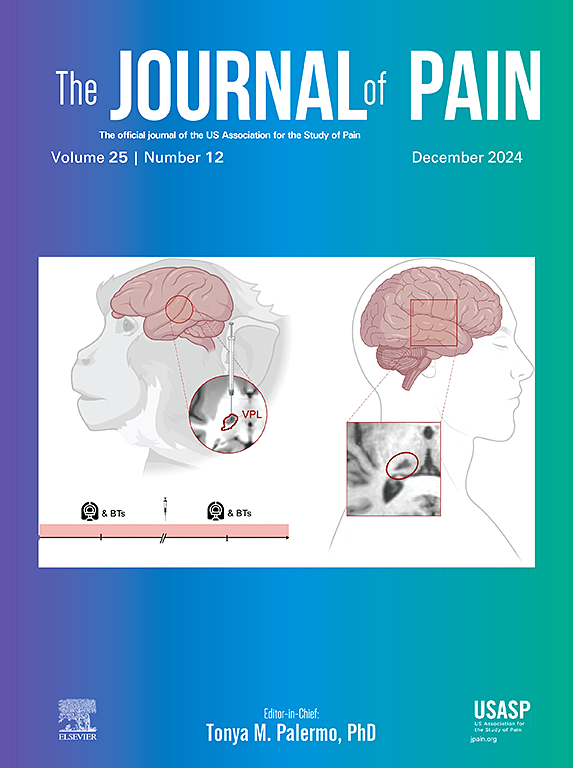Scale development of the Osteoarthritis Conceptualisation Questionnaire: Phase 2 construct validity
IF 4
2区 医学
Q1 CLINICAL NEUROLOGY
引用次数: 0
Abstract
An individual's knowledge, beliefs and/or expectations about their osteoarthritis can influence their engagement with physical activity and their treatment decisions surrounding recommended non-surgical management. Yet there is no widely accepted questionnaire to assess complex mental frameworks surrounding osteoarthritis. Therefore, this study aimed to develop an Osteoarthritis Conceptualisation Questionnaire (OACQ) to assess an individual’s conceptual framework for osteoarthritis via psychometric evaluation of an established item-bank. The OACQ item-bank, co-developed with pain experts and people with lived experience of knee pain, was administered online to people with painful knee osteoarthritis. Psychometric evaluation was undertaken using factor and exploratory graph analyses to create a data-driven model of the OACQ which was then compared with the existing theoretical model (construct validity). Four hundred and fifty-four participants completed the survey (n=336 female; 64.52 ± 9.21 years). Psychometric evaluation resulted in the OACQ, consisting of 36 items across four domains: ‘Expectations’; ‘Context’; ‘Physiology’; and ‘Conceptual Change’. Data-driven models aligned with theoretical models, providing preliminary evidence of construct validity. The resultant OACQ could be used to assess osteoarthritis conceptualisations in people with painful knee osteoarthritis. Further research to evaluate scale and item functioning and test-retest reliability is warranted.
Perspective
Classical and innovative psychometric methods were utilised to develop a novel assessment of conceptualisations of osteoarthritis. The combined use of these methods provided a rigorous evaluation of construct validity. The OACQ may be useful for evaluating the effectiveness of pain science education interventions.
骨关节炎概念化问卷的量表开发:第二阶段结构效度。
个人对骨性关节炎的知识、信念和/或期望会影响他们参与体育活动的程度,以及他们在非手术治疗方面的治疗决定。然而,目前还没有被广泛接受的问卷来评估骨关节炎周围的复杂心理框架。因此,本研究旨在开发一份骨关节炎概念化问卷(OACQ),通过对已建立的题库进行心理测量评估,评估个体对骨关节炎的概念框架。骨关节炎概念化问卷题库是由疼痛专家和有膝关节疼痛生活经验的人共同开发的,对疼痛性膝关节骨关节炎患者进行在线管理。使用因子分析和探索性图分析进行心理测量评估,以创建骨关节炎概念化问卷的数据驱动模型,然后与现有的理论模型(结构效度)进行比较。454名参与者完成了调查(n=336名女性;(64.52±9.21岁)。心理测量评估的结果是骨关节炎概念化问卷,由四个领域的36个项目组成:“期望”;“上下文”;“生理学”;以及“观念的改变”。数据驱动的模型与理论模型一致,为结构有效性提供了初步证据。由此产生的骨关节炎概念化问卷可用于评估疼痛性膝骨关节炎患者的骨关节炎概念化。进一步的研究评估量表和项目功能和测试-重测信度是必要的。观点:经典和创新的心理测量方法被用来开发一种新的骨关节炎概念化评估。这些方法的结合使用提供了一个严格的构念效度评估。OACQ可用于评估疼痛科学教育干预措施的有效性。
本文章由计算机程序翻译,如有差异,请以英文原文为准。
求助全文
约1分钟内获得全文
求助全文
来源期刊

Journal of Pain
医学-临床神经学
CiteScore
6.30
自引率
7.50%
发文量
441
审稿时长
42 days
期刊介绍:
The Journal of Pain publishes original articles related to all aspects of pain, including clinical and basic research, patient care, education, and health policy. Articles selected for publication in the Journal are most commonly reports of original clinical research or reports of original basic research. In addition, invited critical reviews, including meta analyses of drugs for pain management, invited commentaries on reviews, and exceptional case studies are published in the Journal. The mission of the Journal is to improve the care of patients in pain by providing a forum for clinical researchers, basic scientists, clinicians, and other health professionals to publish original research.
 求助内容:
求助内容: 应助结果提醒方式:
应助结果提醒方式:


